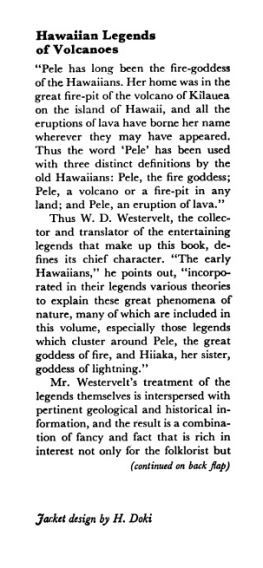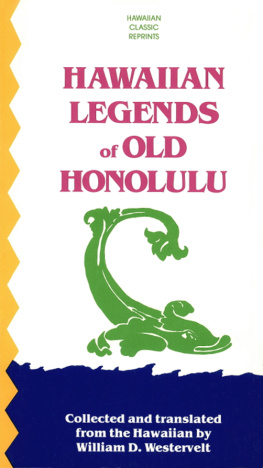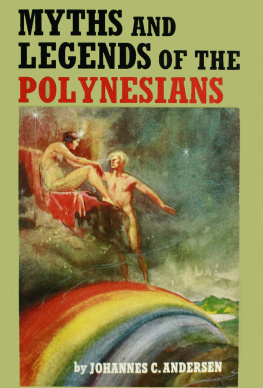PREFACE
Maui is a demi god whose name should probably be pronounced Ma-u-i, i. e., Ma-oo-e. The meaning of the word is by no means clear. It may mean "to live," "to subsist." It may refer to beauty and strength, or it may have the idea of "the left hand" or "turning aside." The word is recognized as belonging to remote Polynesian antiquity.
MacDonald, a writer of the New Hebrides Islands, gives the derivation of the name Maui primarily from the Arabic word "Mohyi," which means "causing to live" or "life," applied sometimes to the gods and sometimes to chiefs as "preservers and sustainers" of their followers.
The Maui story probably contains a larger number of unique and ancient myths than that of any other legendary character in the mythology of any nation.
There are three centers for these legends, New Zealand in the south, Hawaii in the north, and the Tahitian group including the Hervey Islands in the east. In each of these groups of islands, separated by thousands of miles, there are the same legends, told in almost the same way, and with very little variation in names. The intermediate groups of islands of even as great importance as Tonga, Fiji or Samoa, possess the same legends in more or less of a fragmentary condition, as if the three centers had been settled first when the Polynesians were driven away from the Asiatic coasts by their enemies, the Malays. From these centers voyagers sailing away in search of adventures would carry fragments rather than complete legends. This is exactly what has been done and there are as a result a large number of hints of wonderful deeds. The really long legends as told about the demi god Ma-u-i and his mother Hina number about twenty.
It is remarkable that these legends have kept their individuality. The Polynesians are not a very clannish people. For some centuries they have not been in the habit of frequently visiting each other. They have had no written language, and picture writing of any kind is exceedingly rare throughout Polynesia and yet in physical traits, national customs, domestic habits, and language, as well as in traditions and myths, the different inhabitants of the islands of Polynesia are as near of kin as the cousins of the United States and Great Britain.
The Maui legends form one of the strongest links in the mythological chain of evidence which binds the scattered inhabitants of the Pacific into one nation. An incomplete list aids in making clear the fact that groups of islands hundreds and even thousands of miles apart have been peopled centuries past by the same organic race. Either complete or fragmentary Maui legends are found in the single islands and island groups of Aneityum, Bowditch or Fakaofa, Efate, Fiji, Fotuna, Gilbert, Hawaii, Hervey, Huahine, Mangaia, Manihiki, Marquesas, Marshall, Nauru, New Hebrides, New Zealand, Samoa, Savage, Tahiti or Society, Tauna, Tokelau and Tonga.
S. Percy Smith of New Zealand in his book Hawaiki mentions a legend according to which Maui made a voyage after overcoming a sea monster, visiting the Tongas, the Tahitian group, Vai-i or Hawaii, and the Paumotu Islands. Then Maui went on to U-peru, which Mr. Smith says "may be Peru." It was said that Maui named some of the islands of the Hawaiian group, calling the island Maui "Maui-ui in remembrance of his efforts in lifting up the heavens." Hawaii was named Vai-i, and Lanai was called Ngangaias if Maui had found the three most southerly islands of the group.
The Maui legends possess remarkable antiquity. Of course, it is impossible to give any definite historical date, but there can scarcely be any question of their origin among the ancestors of the Polynesians before they scattered over the Pacific ocean. They belong to the prehistoric Polynesians. The New Zealanders claim Maui as an ancestor of their most ancient tribes and sometimes class him among the most ancient of their gods, calling him "creator of land" and "creator of man." Tregear, in a paper before the New Zealand Institute, said that Maui was sometimes thought to be "the sun himself," "the solar fire," "the sun god," while his mother Hina was called "the moon goddess." The noted greenstone god of the Maoris of New Zealand, Potiki, may well be considered a representation of Maui-Tiki-Tiki, who was sometimes called Maui-po-tiki.
Whether these legends came to the people in their sojourn in India before they migrated to the Straits of Sunda is not certain; but it may well be assumed that these stories had taken firm root in the memories of the priests who transmitted the most important traditions from generation to generation, and that this must have been done before they were driven away from the Asiatic coasts by the Malays.
Several hints of Hindoo connection is found in the Maui legends. The Polynesians not only ascribed human attributes to all animal life with which they were acquainted, but also carried the idea of an alligator or dragon with them, wherever they went, as in the mo-o of the story Tuna-roa.
The Polynesians also had the idea of a double soul inhabiting the body. This is carried out in the ghost legends more fully than in the Maui stories, and yet "the spirit separate from the spirit which never forsakes man" according to Polynesian ideas, was a part of the Maui birth legends. This spirit, which can be separated or charmed away from the body by incantations was called the "hau." When Maui's father performed the religious ceremonies over him which would protect him and cause him to be successful, he forgot a part of his incantation to the "hau," therefore Maui lost his protection from death when he sought immortality for himself and all mankind.












